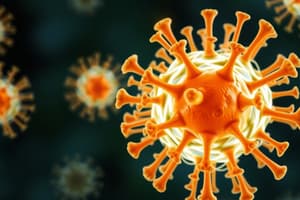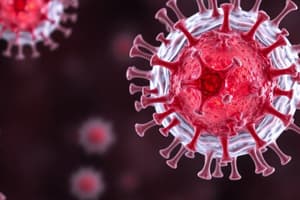Podcast
Questions and Answers
What is the primary role of neutrophils in the innate immune response?
What is the primary role of neutrophils in the innate immune response?
- Activation of T cells
- Production of antibodies
- Defense against helmints
- Phagocytosis of opsonized microorganisms (correct)
In the context of immunity, what does the term 'adaptive immunity' primarily refer to?
In the context of immunity, what does the term 'adaptive immunity' primarily refer to?
- Specific responses tailored to particular pathogens (correct)
- Quick response to pathogens
- Defense mechanisms present at birth
- Immediate response without memory
What historical observation about immunity was made by Tucídides during the Peloponnesian War?
What historical observation about immunity was made by Tucídides during the Peloponnesian War?
- Only healthy individuals could care for the sick
- Immunity was a myth with no scientific basis
- Those who had been infected were immune to future infections (correct)
- People who survived smallpox could not be reinfected
Which cells are primarily involved in the defense against helmints in the innate immune response?
Which cells are primarily involved in the defense against helmints in the innate immune response?
What was a common method used in ancient China to induce immunity to smallpox?
What was a common method used in ancient China to induce immunity to smallpox?
What is one of the immediate effects of degranulation during an allergic reaction?
What is one of the immediate effects of degranulation during an allergic reaction?
What role do macrophages play during local inflammation?
What role do macrophages play during local inflammation?
What is neutrophilia?
What is neutrophilia?
Which of the following factors protects the body from harmful effects associated with inflammation?
Which of the following factors protects the body from harmful effects associated with inflammation?
What characterizes systemic modifications during an acute phase response?
What characterizes systemic modifications during an acute phase response?
What is the primary action of dendritic cells during local inflammation?
What is the primary action of dendritic cells during local inflammation?
What is the role of innate immunity in relation to adaptive immunity?
What is the role of innate immunity in relation to adaptive immunity?
What triggers the increase in body temperature during an acute immune response?
What triggers the increase in body temperature during an acute immune response?
What characteristic distinguishes the secondary immune response from the primary immune response?
What characteristic distinguishes the secondary immune response from the primary immune response?
What is the main purpose of the modification of the tissue microenvironment during inflammation?
What is the main purpose of the modification of the tissue microenvironment during inflammation?
Which of the following is NOT a feature of humoral immunity?
Which of the following is NOT a feature of humoral immunity?
How do memory lymphocytes contribute to the immune response?
How do memory lymphocytes contribute to the immune response?
What is true about the evolution of immune systems across different organisms?
What is true about the evolution of immune systems across different organisms?
Flashcards are hidden until you start studying
Study Notes
Definitions
- Immunology studies the body's defense system against harmful organisms.
- The immune system (IS) consists of cells and organs dedicated to defending the body, functioning through cellular communication.
- The immune response is a coordinated action of the IS against non-self substances entering the body.
Innate and Adaptive Immunity
- Innate immunity is the body's first line of defense, providing immediate but non-specific responses.
- Adaptive immunity develops over time, providing a specific response and memory against pathogens.
Innate Immunity Cells
- Neutrophils: Phagocytose opsonized microorganisms via complement and antibodies.
- Eosinophils: Target helminths using IgE.
- Basophils/Mast Cells: Release mediators like histamine upon activation, contributing to allergic responses.
- Monocytes/Macrophages: Perform phagocytosis and present antigens.
- Natural Killer (NK) Cells: Destroy malignant or virus-infected cells.
- Dendritic Cells: Important for antigen presentation and activation of T cells.
Innate Immune Responses
- Local Inflammation: Characterized by immune cell accumulation and tissue microenvironment modification.
- Systemic Modifications: Include hyperthermia, alterations in blood chemistry and neutrophilia.
Local Inflammation Mechanisms
- Activated macrophages secrete cytokines, enhancing vascular permeability and leukocyte adhesion.
- Mast cell degranulation releases histamines and other mediators, promoting inflammation.
- Neutrophil activation strengthens microbicidal actions.
- Dendritic cells migrate to secondary organs, helping in immune activation.
- Enhanced cytotoxic capacity of NK cells.
Systemic Modifications
- Acute Phase Proteins: Function in inhibiting microorganisms and protecting against inflammation.
- Body Temperature Augmentation: Caused by cytokine action, inhibiting pathogen growth.
- Neutrophilia: Increased production and release of neutrophils from the bone marrow in response to infection.
Adaptive Immunity Components
- Involves specific and acquired responses through memory lymphocytes.
- A second exposure to an antigen results in a stronger and faster response due to memory cells.
Humoral and Cellular Immunity
- Humoral immunity focuses on antibody production against pathogens.
- Cellular immunity involves T cells and direct attacks on infected or malignant cells.
Primary and Secondary Responses
- Primary responses are weaker, while secondary responses are more robust due to memory lymphocytes.
- Secondary response leads to more intense and quicker antibody production, class switching (IgM to IgG), and higher affinity for antigens.
Immune System Phylogeny
- All multicellular organisms possess some defense mechanisms against microbes.
- Innate immunity is the most ancient defense system, present in invertebrates.
- Adaptive immunity emerged in vertebrates through somatic recombination of antigen receptors.
Studying That Suits You
Use AI to generate personalized quizzes and flashcards to suit your learning preferences.




